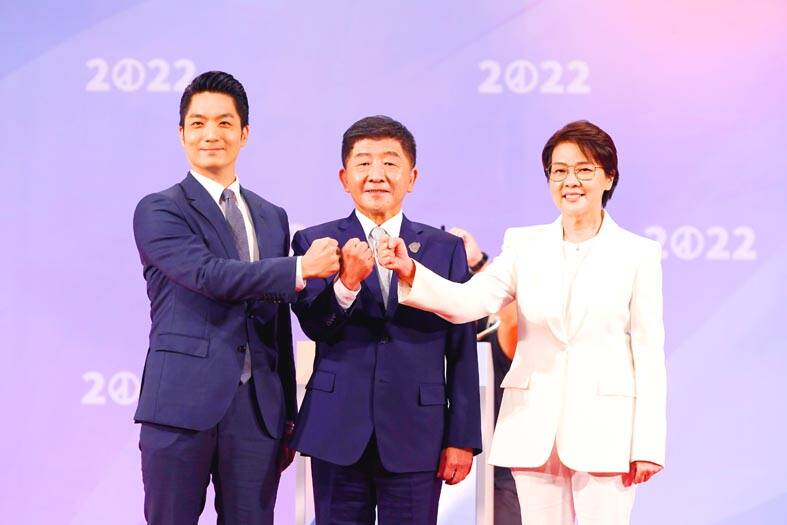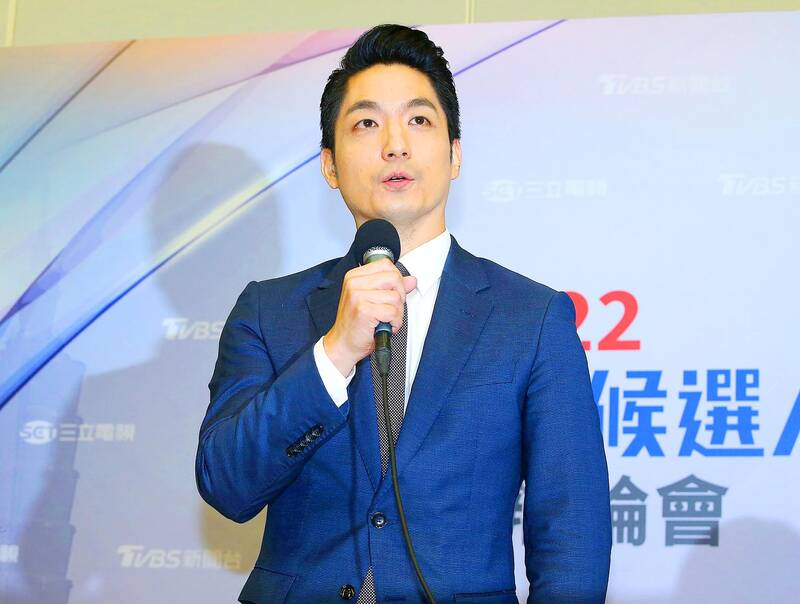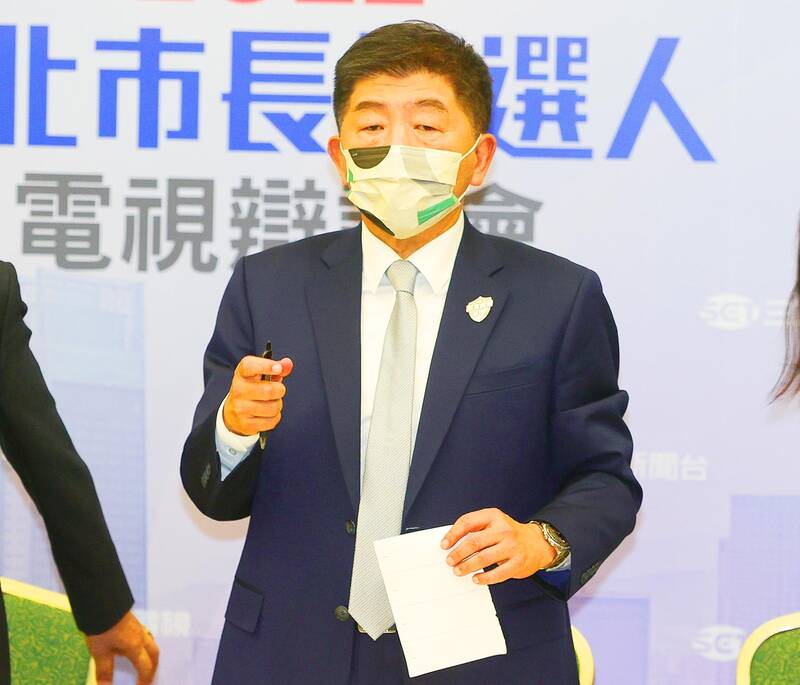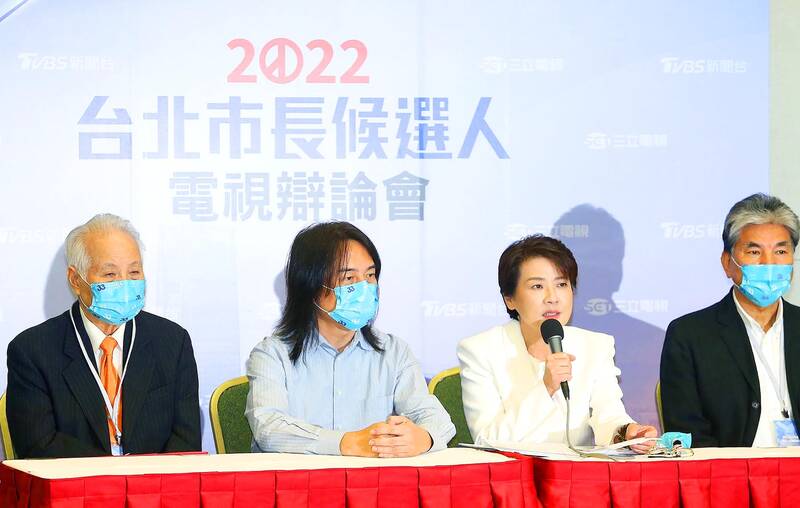The three major candidates vying for Taipei mayor in the Nov. 26 local election yesterday focused on housing and urban renewal in a two-hour SetTV and TVBS debate.
In his opening statements, Chinese Nationalist Party (KMT) Legislator and mayoral candidate Chiang Wan-an (蔣萬安) said he hoped to “revive Taipei,” where he was born and raised.
He called for “one Taipei, four developments, five major hubs.”

Photo courtesy of SetTV and TVBS
That would include making Taipei a more international, livable, technological and innovative city, and a hub for exhibitions, financial activities, 5G development, digital content, and cultural and creative industries, he said.
He also called for urban renewal, saying that more than 70 percent of the city’s buildings are more than 30 years old, and addressed the declining birthrate, saying the number of newborns in the city had declined to 16,695 last year, about half the number eight years ago.
Chiang said he would double the city’s “baby bonus” to NT$40,000, reduce childcare fees for young children and give young parents priority for social housing.

Photo: CNA
Chiang also questioned Democratic Progressive Party (DPP) mayoral candidate Chen Shih-chung (陳時中), who was minister of health and welfare and head of the Central Epidemic Command Center (CECC), about his COVID-19 policies.
In his opening statements, Chen brushed off the questions, saying he had already answered them many times, adding “you cannot wake up a person who is pretending to be asleep.”
Chen said he entered politics because he was passionate about public affairs and disappointed in the performance of Taipei Mayor Ko Wen-je (柯文哲).

Photo: CNA
Chen said he has already proposed 170 policy ideas to improve the city faster, adding that he supports lowering the voting age to 18, which is on a referendum to be held along with the elections.
He said he plans to improve traffic in Neihu District (內湖), push for urban renewal, increase social housing for young people, provide a maternity allowance of NT$36,000, increase access to babysitting services, improve road quality, create pet-friendly spaces and establish an international affairs department to connect Taipei with cities around the world.
Independent Taipei mayoral candidate Vivian Huang (黃珊珊), who is endorsed by Ko and the Taiwan People’s Party (TPP), said her 21 years as a Taipei city councilor and three years as deputy mayor showed she clearly understands city governance.

Photo: CNA
Calling herself the most “battle-ready” candidate to be mayor, Huang said she could immediately tackle the city’s pressing problems, including the high cost of housing, a rapidly aging population, extreme weather due to climate change, energy issues and housing justice.
She encouraged voters to push aside the conflicts of the pan-blue and pan-green camps and vote for her to be Taipei’s first female mayor.
Regarding the scandal-dogged Taipei Dome, which Chen brought up, Huang said that issues with its construction started under the KMT and had been dealt with by Ko, despite obstructions from the DPP-led government.
Chiang said the dome should be dealt with according to the law, and that he would negotiate with the construction company for a better solution, while ensuring that it would be a safe venue for sports.
A TVBS reporter asked the candidates how they would ensure housing justice and lower housing costs.
Chiang said that low salaries and high costs have made it difficult for young people to own a home, while the city government’s poor planning and execution have hindered social housing programs.
He said he would provide more job opportunities by seeking to revive businesses in the city, while offering rent subsidies.
Huang said that Ko’s administration built more social housing units than anywhere else in the country, so she would continue his policies, while seeking to transform hotels into housing units and offering incentives for people to lease empty properties.
She also questioned Chiang on why he did not propose social housing bills in his six years as a legislator.
Chen said he would build more social housing units and increase the number subleased by property management companies to a total of 57,000 social housing units, cooperate with the central government to release more public land or facilities, and also offer rent discounts and subsidies.
A SetTV reporter asked the candidates what they would do to protect freedom and democracy in the face of threats from China.
Chen said that Taiwan is a sovereign country, and he would increase civil defense personnel and substantially enhance civil defense training, as well as educate the public on how to identify disinformation.
Chiang said that he would abide by the Constitution in defending defends the nation’s democracy and freedom, adding that he would carry out air defense drills.
Huang said that her guiding principle would be “peace first, priority to prosperity and the people.”
In their concluding remarks, Huang said that Taipei should support an independent candidate, who has always pursued fairness and justice.
Chiang said that with his skills as a Silicon Valley lawyer, legislator and father, he would seek to bring Taipei to the world.
Chen said that the COVID-19 pandemic brought people in Taiwan together, and he hopes to devote the last stage of his political life to serving Taipei, his favorite city.

TRAGEDY STRIKES TAIPEI: The suspect died after falling off a building after he threw smoke grenades into Taipei Main Station and went on a killing spree in Zhongshan A 27-year-old suspect allegedly threw smoke grenades in Taipei Main Station and then proceeded to Zhongshan MRT Station in a random killing spree that resulted in the death of the suspect and two other civilians, and seven injured, including one in critical condition, as of press time last night. The suspect, identified as a man surnamed Chang Wen (張文), allegedly began the attack at Taipei Main Station, the Taipei Fire Department said, adding that it received a report at 5:24pm that smoke grenades had been thrown in the station. One man in his 50s was rushed to hospital after a cardiac arrest

SAFETY FIRST: Double the number of police were deployed at the Taipei Marathon, while other cities released plans to bolster public event safety Authorities across Taiwan have stepped up security measures ahead of Christmas and New Year events, following a knife and smoke bomb attack in Taipei on Friday that left four people dead and 11 injured. In a bid to prevent potential copycat incidents, police deployments have been expanded for large gatherings, transport hubs, and other crowded public spaces, according to official statements from police and city authorities. Taipei Mayor Chiang Wan-an (蔣萬安) said the city has “comprehensively raised security readiness” in crowded areas, increased police deployments with armed officers, and intensified patrols during weekends and nighttime hours. For large-scale events, security checkpoints and explosives

PUBLIC SAFETY: The premier said that security would be tightened in transport hubs, while President Lai commended the public for their bravery The government is to deploy more police, including rapid response units, in crowded public areas to ensure a swift response to any threats, President William Lai (賴清德) said yesterday after a knife attack killed three people and injured 11 in Taipei the previous day. Lai made the remarks following a briefing by the National Police Agency on the progress of the investigation, saying that the attack underscored the importance of cooperation in public security between the central and local governments. The attack unfolded in the early evening on Friday around Taipei Main Station’s M7 exit and later near the Taipei MRT’s Zhongshan

A car bomb killed a senior Russian general in southern Moscow yesterday morning, the latest high-profile army figure to be blown up in a blast that came just hours after Russian and Ukrainian delegates held separate talks in Miami on a plan to end the war. Kyiv has not commented on the incident, but Russian investigators said they were probing whether the blast was “linked” to “Ukrainian special forces.” The attack was similar to other assassinations of generals and pro-war figures that have either been claimed, or are widely believed to have been orchestrated, by Ukraine. Russian Lieutenant General Fanil Sarvarov, 56, head